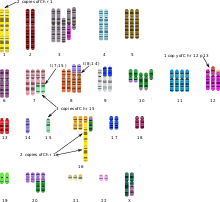T-47D
T-47D is a human breast cancer cell line commonly used in biomedical research involving the hormonal expression of cancer cells.[1]

Characteristics
The cells were derived from the pleural effusion of a ductal carcinoma found in the mammary gland of an elderly human patient. T-47D cells are distinct from other human breast cancer cells in that their progesterone receptors are not regulated by estradiol, a hormone that is abundant within the cells themselves.[2]
Usage
T-47D cells have been employed in studies of the effects of progesterone on breast cancer and the corresponding transcriptional regulation caused by introduced drugs.[3] T-47D cells can be implanted into immunodeficient mice, forming xenografts that can undergo drug testing with corresponding receptor status and angiogenesis changes. The cells have been noted to be extremely resistant to estrogens and antiestrogens, possibly due to inhibition by 5-bromodeoxyuridine and sodium butyrate.[2]
References
- Yu, S; et al. (6 May 2017). "The T47D cell line is an ideal experimental model to elucidate the progesterone-specific effects of a luminal A subtype of breast cancer". Biochemical and Biophysical Research Communications. 486 (3): 752–758. doi:10.1016/j.bbrc.2017.03.114. PMID 28342866.
- Horowitz, Kathryn; et al. (March 1982). "Variant T47D human breast cancer cells with high progesterone-receptor levels despite estrogen and antiestrogen resistance" (PDF). Cell. 28 (3): 633–642. doi:10.1016/0092-8674(82)90218-5. PMID 7200400.
- Sartorios, Carol; et al. (15 July 1994). "New T47D Breast Cancer Cell Lines for the Independent Study of Progesterone B- and A-Receptors: Only Antiprogestin-occupied B-Receptors Are Switched to Transcriptional Agonists by cAMP'" (PDF). Cancer Research. 54: 3868–3877.